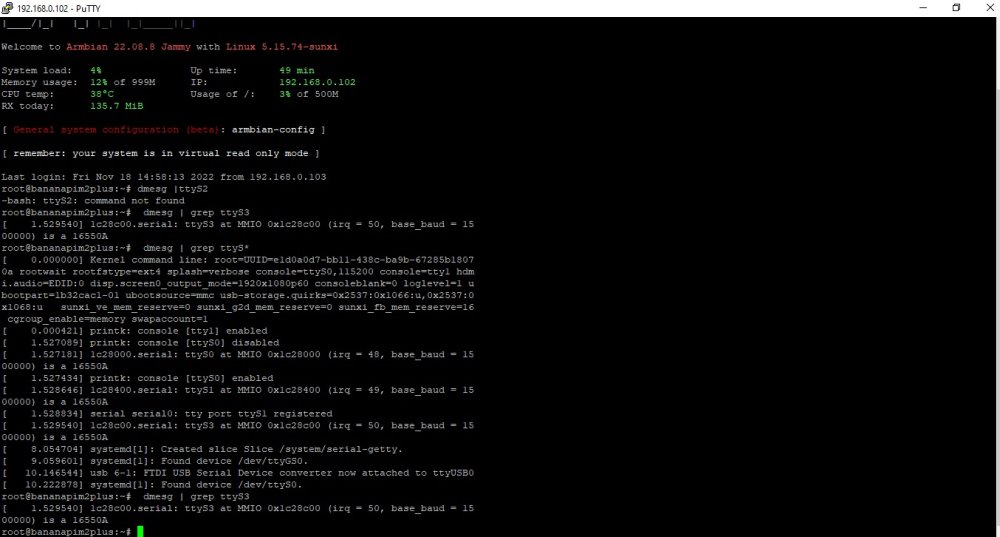Search the Community
Showing results for tags 'bananapim2plus'.
-
My Banana Pi M2+ is running quite fine on noble but something is amiss with bluetooth. bluetoothctl never shows any devices even when scanning for them and there are plenty of devices within arm's length. I am hoping for your help in diagnosing and ultimately fixing the issue. Logs:
-
Dear Community, I'll build a Developer Team specially for Banana Pi Boards!" GPIO Libarys I started updating/modifing the old GPIO-Libarys, so they can be used on the latest builds! I want to build a Team, for GPIO-Libary Development, for porting these Libarys: WiringPi-Node WiringPi-PHP WiringPi-Perl WirinigPi-Ruby gpiozero rpi-gpio Updating and modifying these: RPi.GPIO BPI-WiringPi2-Python BPI-WiringPi2 At the end, all currently working GPIO Libarys are: luma.oled RPi.GPIO BPI-WiringPi BPI-WiringPi2 BPI-WiringPi2-Python Armbian Build System for Banana Pi I started building the build-system for full banana pi support! Anyone who would like to join the developer-team, just pn me, post in this thread, or contact me on github or discord!" I created a GIthub-Organisation for this project and a Discord Server. A Domain & VPS Server is commin Monday!" Goals: Support ONLY for Banana Pi Boards Board Determiner Script which exports Board-Infos, required by gpio-libs (usual located at: /var/lib/bananapi) APT-Mirror Archive Hosted by our project-teams vps-server! ( Mirror stores all latest gpio-libarys we specially build for using on latest builds and other packages we'll develope in future) Added APPGROUPS: Pentesting, TV-Box, Server-Side, Game Desk & Development Revised menu for selecting extensions and other additional items Revised config menu Adding additional build options A Web-Based Project-Server Hosted Build-System will be build and available on the project-page, where you can build images remotely, according to you settings made in the WebInterface, with live progress & build-log + downloading compressed own image-release. A publish option will be added to, where you can upload your builded image to any Cloud/Storage we provide. Revised device trees According to APPGROUPS and Enabled Extensions: I2C, SPI, UART are enabled in the gpio_develope extension, and all requirements for gpio-programming are pre-installed, the gpio libs are pre-installed too. If you have some Ideas, what we could add or which wishes we can make true, just reply in this post, or contact us. Github Organisation Discord greetz, hexzhen3x7
- 6 replies
-
- Banana Pi M4 Zero
- Banana Pi M7
-
(and 18 more)
Tagged with:
- Banana Pi M4 Zero
- Banana Pi M7
- Banana Pi F3
- Banana Pi M5 Pro
- Banana Pi
- Banana Pi BPi-M2+
- Banana Pi BPI-M64
- Banana Pi BPI-M1+
- Banana Pi BPI-M2
- Banana Pi BPI-M2U
- Banana Pi BPI-M2 ZERO
- Banana Pi BPI-M3
- Banana Pi BPI-R2
- Banana Pi BPI-M1
- Banana Pi BPI-M2 Pro
- Banana Pi M5
- Banana Pi BPi-M2S
- Banana Pi BPI-R2 Pro
- Bananapi CM4 io
- Banana Pi Pro
-
Hello, I am curious to hear how accurate the measurement of temperature is from the onboard sensors, particularly in my case for the Banana Pi M2+. While I do understand that the BPi M2+ suffered from poor choices for thermal management from the manufacturer both in hardware and software, I believe that thankfully Armbian has worked out the kinks on the software side, hasn't it? I am running the latest noble image, here's what I noticed. The temperature as shown by the sensors and armbianmonitor commands never really goes below 60° even on idle with ambient temperatures of around 25 to 30 degrees. My SBC already came with a small heatsink attached to the CPU. I found that value pretty high and inquired with an infrared thermometer but couldn't really find a spot on the board over 40°. Which makes me wonder if the reading is accurate and properly calibrated? My impression is that it is not. Furthermore, I noticed the board behaves quite well under load. For example, I stress-tested it with the yes command on all cores for about an hour or so and while the temperature went up to 95°, it appears the software was well-tweaked to only slightly throttle the CPU (verified with armbianmonitor -m) to not exceed this. I am not 100% sure about the thermometer readings, but I believe they were around 60° at the time, certainly nowhere near what sensors was showing. I have been testing the board for about a week now and I have to say that one time, the board did indeed shut down due to thermal overload. Interestingly, this wasn't even when the CPU was heavily loaded but there was a lot of IO wait. Temperature was high and it briefly shot up to 101° (ouch) which triggered an emergency shutdown to prevent thermal damage. Looked good to me, mostly. So, again, my question today is how trustworthy are the readings from the sensors, are they properly calibrated?
- 4 replies
-
- Banana Pi
- Banana Pi BPi-M2+
- (and 4 more)
-
Hello, long time Banana Pi user here. I have a BPI-M2+ and recently decided to write Armbian_23.02.2_Bananapim2plus_bullseye_current_5.15.93_minimal.img to emmc. I am using cat6 over gigabit LAN and am seeing scp and rsync transfers to the device averaging 1.7mb/s. Transfering an 850mb file took unusually several minutes. It starts off at 40mb/s then quickly drops to under 2mb/s. Is this typical? I would think over LAN I would be seeing much faster speeds. Untarring this same 850mb archive also took unusually long. Could the emmc be damaged or on it's way out? How would I check? Please see armbianmonitor output. https://pastebin.com/RCaPzUEz
-
Hello everyone, I am an old-timer in Debian and Ubuntu and have uploaded and maintained packages there. I've come across an issue in a package that I use that affects 32-bit platforms such as armv7 but not 64-bit platforms. I've already analysed the problem and applied a fix, compiled the package locally and I'm happy. But I'd like to get the fix into armbian as well so others will not run into this fairly serious problem (for the package in question, it is essentially useless at the moment in noble). I looked through the various github repositories but was unable to see how to apply a patch to a userland package and have it published. Given that armbian systems seem to pull their packages from ports.ubuntu.com, is it that armbian does no patching of their own to packages but instead relies on Ubuntu and Debian to land their fixes? If that's the case, I've already started the process but I'd like to know if there is an armbian-specific way of fixing userland as well. Regards
-
https://paste.armbian.com/faquvejaxo works ok for my alternate 2G4 network. Scanning wifi does not show any 5G8 networks. From dmesg: bananapim2plus:brcm:% dmesg |grep -i brcm [ 7.495253] brcmfmac: brcmf_fw_alloc_request: using brcm/brcmfmac43430-sdio for chip BCM43430/1 [ 7.497405] brcmfmac mmc1:0001:1: Direct firmware load for brcm/brcmfmac43430-sdio.sinovoip,bpi-m2-plus.bin failed with error -2 [ 7.497440] brcmfmac mmc1:0001:1: Falling back to sysfs fallback for: brcm/brcmfmac43430-sdio.sinovoip,bpi-m2-plus.bin [ 7.871128] brcmfmac mmc1:0001:1: Direct firmware load for brcm/brcmfmac43430-sdio.sinovoip,bpi-m2-plus.txt failed with error -2 [ 7.871159] brcmfmac mmc1:0001:1: Falling back to sysfs fallback for: brcm/brcmfmac43430-sdio.sinovoip,bpi-m2-plus.txt [ 7.993563] brcmfmac: brcmf_fw_alloc_request: using brcm/brcmfmac43430-sdio for chip BCM43430/1 [ 7.995261] brcmfmac: brcmf_c_process_clm_blob: no clm_blob available (err=-2), device may have limited channels available [ 7.996183] brcmfmac: brcmf_c_preinit_dcmds: Firmware: BCM43430/1 wl0: Mar 30 2016 11:30:56 version 7.45.77.h8.4 FWID 01-ee8a6268 [ 18.307085] Bluetooth: hci0: BCM43430A1 'brcm/BCM43430A1.hcd' Patch not sure if or how to apply hints from here thank you for all your work
-
Hi, I could enable "spidev" support by armbian-config -> system -> hardware (enable spidev) . Everything worked fine. However, the original spidev module supports messages only up to 4096 bytes. I compiled a new version of custom spidev.ko with the 32,768 buffer size. Then, converted it to spidev.ko.xz ( xz -v spidev.ko) and replaced the original file under /lib/modules/5.15.85-sunxi/kernel/drivers/spi/spidev.ko.xz The new module works fine when I install it manually: insmod /lib/modules/5.15.85-sunxi/kernel/drivers/spi/spidev.ko.xz However, after the reboot the original 4096-byte version of "spidev" module is loaded magically. It is loaded even if I remove the /lib/modules/5.15.85-sunxi/kernel/drivers/spi/spidev.ko.xz file. I searched through the whole micro-SD partition and cound not find any copy of spidev.ko.xz or spidev.ko Would you please explaine the mystery ? Thanks in advance
-
Hello, could be possible to introduce the package with newest available GDB 13.2? The version 13.1 is rather unusable — it segfaults on regular basis.
-
Hi All, I have a BPI-M2 ZERO, BANANA-PI-ZERO with SERIAL to USB plugged in. It's being detected by lsusb Bus 002 Device 005: ID 1a86:7523 QinHeng Electronics CH340 serial converter but it doesn't appear under /dev/ttyUSB0 The problem is that I can't see it under /dev/ as /dev/ttyUSB0. I haven't tried installing CH340 drivers yet. Should I use the ones for Ubuntu? Here is the tutorial I found but I'm not sure if those are the correct drivers: https://learn.sparkfun.com/tutorials/how-to-install-ch340-drivers/all uname -a Linux bananapim2zero 6.2.13-sunxi #1 SMP Wed Apr 26 12:30:09 UTC 2023 armv7l GNU/Linux sudo lsusb Bus 002 Device 006: ID 413c:2110 Dell Computer Corp. Dell Wired Multimedia Keyboard Bus 002 Device 005: ID 1a86:7523 QinHeng Electronics CH340 serial converter Bus 002 Device 004: ID 413c:1010 Dell Computer Corp. USB 2.0 Hub [MTT] Bus 002 Device 003: ID 05c6:f00e Qualcomm, Inc. Android Bus 002 Device 002: ID 0a05:7211 Unknown Manufacturer hub Bus 002 Device 001: ID 1d6b:0001 Linux Foundation 1.1 root hub Bus 001 Device 001: ID 1d6b:0002 Linux Foundation 2.0 root hub sudo lsusb -t -v /: Bus 02.Port 1: Dev 1, Class=root_hub, Driver=ohci-platform/1p, 12M ID 1d6b:0001 Linux Foundation 1.1 root hub |__ Port 1: Dev 2, If 0, Class=Hub, Driver=hub/4p, 12M ID 0a05:7211 Unknown Manufacturer hub |__ Port 2: Dev 3, If 0, Class=Wireless, Driver=rndis_host, 12M ID 05c6:f00e Qualcomm, Inc. |__ Port 2: Dev 3, If 1, Class=CDC Data, Driver=rndis_host, 12M ID 05c6:f00e Qualcomm, Inc. |__ Port 4: Dev 4, If 0, Class=Hub, Driver=hub/4p, 12M ID 413c:1010 Dell Computer Corp. |__ Port 4: Dev 6, If 1, Class=Human Interface Device, Driver=usbhid, 1.5M ID 413c:2110 Dell Computer Corp. |__ Port 4: Dev 6, If 0, Class=Human Interface Device, Driver=usbhid, 1.5M ID 413c:2110 Dell Computer Corp. /: Bus 01.Port 1: Dev 1, Class=root_hub, Driver=ehci-platform/1p, 480M ID 1d6b:0002 Linux Foundation 2.0 root hub grep CH34 /boot/config-6.2.13-sunxi CONFIG_USB_SERIAL_CH341=m ls /dev/ | grep -i usb usb ls /dev/ | grep -i tty tty tty0 tty1 tty10 tty11 tty12 tty13 tty14 tty15 tty16 tty17 tty18 tty19 tty2 tty20 tty21 tty22 tty23 tty24 tty25 tty26 tty27 tty28 tty29 tty3 tty30 tty31 tty32 tty33 tty34 tty35 tty36 tty37 tty38 tty39 tty4 tty40 tty41 tty42 tty43 tty44 tty45 tty46 tty47 tty48 tty49 ttty5 tty50 tty51 tty52 tty53 tty54 tty55 tty56 tty57 tty58 tty59 tty6 tty60 tty61 tty62 tty63 tty7 tty8 tty9 ttyS0 ttyS2 ttyS3 ttyS4 ttyS5 ttyS6 ttyS7
-
raw_gadget compile failed make make -C /lib/modules/5.15.93-sunxi/build M=/root/raw-gadget-master/raw_gadget SUBDIRS=/root/raw-gadget-master/raw_gadget modules make[1]: Entering directory '/usr/src/linux-headers-5.15.93-sunxi' MODPOST /root/raw-gadget-master/raw_gadget/Module.symvers make[3]: *** No rule to make target '/root/raw-gadget-master/raw_gadget/raw_gadget.mod.o', needed by '/root/raw-gadget-master/raw_gadget/raw_gadget.ko'. Stop. make[2]: *** [scripts/Makefile.modpost:139: __modpost] Error 2 make[1]: *** [Makefile:1820: modules] Error 2 make[1]: Leaving directory '/usr/src/linux-headers-5.15.93-sunxi' I cat Module.sysmvers in /usr/src/linux-headers-5.15.93-sunxi/ 0x00000000 ipu_cpmem_set_burstsize drivers/gpu/ipu-v3/imx-ipu-v3 EXPORT_SYMBOL_GPL 0x00000000 af_alg_free_resources crypto/af_alg EXPORT_SYMBOL_GPL 0x00000000 __traceiter_pnfs_mds_fallback_pg_get_mirror_count fs/nfs/nfsv4 EXPORT_SYMBOL_GPL 0x00000000 cfg80211_bss_flush net/wireless/cfg80211 EXPORT_SYMBOL 0x00000000 nf_nat_pptp_hook_outbound net/netfilter/nf_conntrack_pptp EXPORT_SYMBOL_GPL 0x00000000 adt7x10_remove drivers/hwmon/adt7x10 EXPORT_SYMBOL_GPL 0x00000000 i3c_generic_ibi_get_free_slot drivers/i3c/i3c EXPORT_SYMBOL_GPL 0x00000000 typec_unregister_plug drivers/usb/typec/typec EXPORT_SYMBOL_GPL 0x00000000 free_candev drivers/net/can/dev/can-dev EXPORT_SYMBOL_GPL 0x00000000 ipu_image_convert_sync drivers/gpu/ipu-v3/imx-ipu-v3 EXPORT_SYMBOL_GPL 0x00000000 __SCK__tp_func_bcache_journal_replay_key drivers/md/bcache/bcache EXPORT_SYMBOL_GPL 0x00000000 madera_dev_exit drivers/mfd/madera EXPORT_SYMBOL_GPL 0x00000000 flow_offload_free net/netfilter/nf_flow_table EXPORT_SYMBOL_GPL 0x00000000 nat_t120_hook net/netfilter/nf_conntrack_h323 EXPORT_SYMBOL_GPL 0x00000000 stm_data_write drivers/hwtracing/stm/stm_core EXPORT_SYMBOL_GPL 0x00000000 dm_array_walk drivers/md/persistent-data/dm-persistent-data EXPORT_SYMBOL_GPL 0x00000000 nci_core_reset net/nfc/nci/nci EXPORT_SYMBOL 0x00000000 ceph_cls_set_cookie net/ceph/libceph EXPORT_SYMBOL 0x00000000 inet_sk_diag_fill net/ipv4/inet_diag EXPORT_SYMBOL_GPL 0x00000000 arpt_unregister_table net/ipv4/netfilter/arp_tables EXPORT_SYMBOL 0x00000000 __traceiter_bcache_bypass_sequential drivers/md/bcache/bcache EXPORT_SYMBOL_GPL 0x00000000 rc_map_af9005_table_size drivers/media/usb/dvb-usb/dvb-usb-af9005-remote EXPORT_SYMBOL 0x00000000 stv0367ter_attach drivers/media/dvb-frontends/stv0367 EXPORT_SYMBOL 0x00000000 stv0367ddb_attach drivers/media/dvb-frontends/stv0367 EXPORT_SYMBOL 0x00000000 stv0367cab_attach drivers/media/dvb-frontends/stv0367 EXPORT_SYMBOL 0x00000000 gether_setup_name_default drivers/usb/gadget/function/u_ether EXPORT_SYMBOL_GPL 0x00000000 nvme_host_path_error drivers/nvme/host/nvme-core EXPORT_SYMBOL_GPL root@bananapim2plus:~/raw-gadget-master/raw_gadget/patches# why all 0x00000000?
-
kernel version Linux bananapim2plus 5.15.93-sunxi #23.02.2 SMP Fri Feb 17 23:49:46 UTC 2023 armv7l GNU/Linux dmesg [ 1065.023248] udc-core: couldn't find an available UDC or it's busy [ 1065.023290] misc raw-gadget: fail, usb_gadget_probe_driver returned -16 [ 1193.665509] udc-core: couldn't find an available UDC or it's busy [ 1193.665534] misc raw-gadget: fail, usb_gadget_probe_driver returned -16 [ 2883.115015] udc-core: couldn't find an available UDC or it's busy [ 2883.115040] misc raw-gadget: fail, usb_gadget_probe_driver returned -16 [ 2908.077549] udc-core: couldn't find an available UDC or it's busy [ 2908.077574] misc raw-gadget: fail, usb_gadget_probe_driver returned -16 [ 2918.836034] udc-core: couldn't find an available UDC or it's busy [ 2918.836060] misc raw-gadget: fail, usb_gadget_probe_driver returned -16 [ 2941.725657] udc-core: couldn't find an available UDC or it's busy [ 2941.725681] misc raw-gadget: fail, usb_gadget_probe_driver returned -16 [ 2968.413688] udc-core: couldn't find an available UDC or it's busy [ 2968.413712] misc raw-gadget: fail, usb_gadget_probe_driver returned -16
-
Good morning, I am using a version compiled with your script for Banana Pi M2 Berry to build a network HiFi streamer, and I am satisfied with it. I have installed LMS and Squeezelite, and everything is working great. Now I would like to add an Innomaker HAT AMP that has a 12V power connector that powers the Raspberry Pi at 5V via GPIO. The GPIO of the Banana Pi M2 Berry is declared compatible with the Raspberry Pi3, but I would like to be sure before frying the board in case it is not. Can you please confirm the total compatibility of the GPIO connector of the Banana Pi with that of the Raspberry Pi? Thank you for your response.
-
Hello. Somehow TX on UART 3 is not working. I connected USB-UART converter or the Banana Pi Zero M2 UART 3 Pins (as it shown here https://bananapi.gitbook.io/bpi-m2/en/bpi-m2_gpio_pin_define), set Baud rate, but I can't send anything from the SBC to PC. But I can send messages from PC to Banana pi. The converter is working properly(tested on Arduino). Do you have any ideas why? Physically nothing looks damaged, wires are soldered accurately and correctly.... Some system info $ uname -r 6.1.2-sunxi $ cat /etc/os-release PRETTY_NAME="Armbian 23.02.0-trunk Jammy" NAME="Ubuntu" VERSION_ID="22.04" VERSION="22.04.1 LTS (Jammy Jellyfish)" VERSION_CODENAME=jammy ID=ubuntu ID_LIKE=debian HOME_URL="https://www.ubuntu.com/" SUPPORT_URL="https://help.ubuntu.com/" BUG_REPORT_URL="https://bugs.launchpad.net/ubuntu/" PRIVACY_POLICY_URL="https://www.ubuntu.com/legal/terms-and-policies/privacy-policy" UBUNTU_CODENAME=jammy $ cat /boot/armbianEnv.txt | grep overlay overlay_prefix=sun8i-h3 overlays=uart2 uart3
-
Hi, We are using trying to use Banana PI M2+ for our application , we mainly use UART and Ethernet on module. uname -a details are below. Linux bananapim2plus 5.15.74-sunxi #22.08.6 SMP Tue Oct 18 07:00:33 UTC 2022 armv7l armv7l armv7l GNU/Linux We Enabled UART 3 by adding below command line on /boot/armbianEnv.txt as overlays=uart3 Pin Number: 8 & 10 We can able to transmit and receive data for uart3. We need to enable one more UART to communicate, We tried overlays=uart2 , We failed to enable, Can anyone guide us to enable one more UART in Banana pi M2+ Regards, K.L.Narayanan



